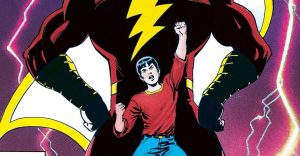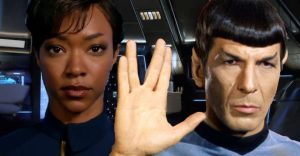Avengers Theory: Scarlet Witch Won Infinity War, Endgame Rebooted the MCU

Avengers: Endgame took the MCU deep into time travel territory, but Scarlet Witch may have already defeated Thanos and won the Infinity War. Debuting in the post-credits segments of Captain America: The Winter Soldier, Elizabeth Olsen’s Scarlet Witch may not be one of the most prominent Avengers in the Marvel Cinematic Universe, but she’s arguably one of the most powerful. This was shown in no uncertain terms during the climax of Avengers: Infinity War.
Due to her upbringing and Infinity Stone-imbued superpowers, Scarlet Witch is very much a lost soul, especially after the death of her brother, Quicksilver, in Avengers: Age of Ultron. Taking influence from the Marvel comic books, Scarlet Witch finds a kindred spirit in Vision, an artificial life form also given power by the Infinity Stones, and the two embark on a clandestine romance, meeting in secret to prop up Scottish kebab houses. All of which adds to the feeling of tragedy when Vision asks his partner, as one of the few beings powerful enough for the task, to destroy the Mind Stone and prevent Thanos completing the collection in his gauntlet.
Tearfully, Scarlet Witch has no choice but to carry out Vision’s wish. However, Thanos effortlessly renders her struggle futile with the Time Stone, rewinding events by a few seconds and preventing the Mind Stone’s destruction. Now that the rules of time travel in the MCU have finally been laid out, thanks to Avengers: Endgame, it could be theorized that Scarlet Witch’s actions actually saved the world. Or one of them at least.
Avengers: Endgame Created The Multiverse

The idea that the MCU exists as part of a Multiverse, as is the case within the Marvel comics, had already been raised in both Doctor Strange and Ant-Man & The Wasp, however Avengers: Endgame took that concept to an entirely new level and there are two key scenes that establish the mechanics of multiple timelines within the franchise. The first comes when the Avengers are testing out their prototype Quantum Realm suit and discussing how time travel works in the world of movies and TV. Here, the audience learns that the present day cannot be rewritten by travelling back in time and altering the past. War Machine suggests going back to when Thanos was a nothing but a small, purple bundle of joy and killing him to prevent the Titan ever becoming a threat, however both Hulk and Nebula confirm this would not be the case. Instead, the Thanos in the past timeline would be dead, but the snap-happy villain in the present would’ve still achieved his goal.
Tilda Swinton’s Ancient One expands on this mind-bending science lesson when Hulk attempts to nab her Time Stone. Ms. One reveals that changing the past will also create a splinter timeline, pointing out that if she lent her Hulk her Eye of Agamotto, her own timeline would then come under threat from inter-dimensional entities and the Earth of that period would suffer a different, yet still apocalyptic, fate to the one Hulk is seeking to prevent.
These rules have several implications. Firstly, the slightest alterations to the timeline can lead to the birth of a whole new reality, potentially resulting in countless alternate worlds. And secondly, there is far more at stake than just the part of the MCU the audience sees, potentially including over 14,000,000 futures where Thanos actually won. When breaking the laws of nature, the Avengers cannot simply prioritize their own universe at the expense of all others.
Scarlet Witch Defeated Thanos In Avengers: Infinity War

Scarlet Witch very nearly prevented Thanos’ snap by sacrificing Vision and destroying the Mind Stone before the Mad Titan could get his hands on it. And she would have gotten away with it too, if it wasn’t for the pesky Time Stone, which Thanos used to undo Vision’s demise and subsequently pluck the final stone from the android’s forehead. If it’s assumed that any infraction upon time creates a new divergence, then this scene finds Thanos splitting the MCU.
In one timeline (the one the audience is seeing), Thanos has nullified the damage to the Mind Stone and promptly completed his mission to wipe out half of all life in the universe, thus beginning a period of mourning and, ultimately, the events of Avengers: Endgame. Considering this scene alongside the Ancient One’s logic that events can never truly be rewritten, and that changing the past only causes a new timeline to emerge, and it could be argued that another timeline should exist where Scarlet Witch’s plan worked and the MCU was saved. Somewhere out there in the Multiverse is a world where the Mind Stone was broken and the entire snap scenario was averted. The Avengers won the Infinity War.
What would happen to Thanos in this situation is perhaps less clear. As the controller of the Time Stone, he might have instantaneously abandoned the universe where Scarlet Witch destroyed the Mind Stone and populated a new one where Vision was brought back to life. Alternatively, the divergence in the timelines could’ve created two version of Thanos (along with everyone else in the Universe): the one that rewinds time and pulls off the snap, and one that must face having lost to Scarlet Witch. In the second scenario, it seems likely that the Avengers would soon find a way to defeat the Titan without the added pressure of worrying about his increasingly colorful gauntlet.
Endgame (And The Rest Of The MCU) Takes Place In A New Timeline

Should this theory be correct, everything taking place after Scarlet Witch’s big moment exists within a brand new, rebooted MCU, including Avengers: Endgame and Spider-Man: Far From Home. What the audience is currently watching isn’t set within the same world as previous movies, but rather a branch timeline created by Thanos resurrecting Vision and rebuilding the Mind Stone, with all the same history and characters as before, but set aside from the “prime” timeline of the MCU.
Under the terms of this theory, however, the prime MCU timeline has already long been abandoned, as Doctor Strange made full use of the Time Stone’s power in his 2016 solo movie, and therefore would’ve already diverted from the franchise’s original timeline, first by messing around with an apple, and then later by preventing the release of the Dark Dimension.
Spider-Man: Far From Home is set to introduce Jake Gyllenhaal’s Mysterio, a character that purports to have traveled from another world through a crack in the Multiverse, created by the events of Avengers: Endgame. While Mysterio’s account can’t necessarily be taken at face value, it does look like the forthcoming Spidey adventure will fully embrace the idea of parallel realities within the MCU and set a precedent for the franchise moving forward.
The Fatal Flaw In Avengers: Endgame’s Time Travel Logic

The strength of this theory largely rests on how viewers interpret the power of the Time Stone. It could be said that Doctor Strange and Thanos only use the stone’s power to rewind a certain element of the current timeline, and this therefore won’t create a separate divergent world like changing the past usually would. This is certainly open to debate and remains unaddressed in the MCU at present, but the Ancient One does seem to imply that any sort of meddling with the timeline can create splits in the natural flow and use of the Time Stone certainly falls into this category.
Problematically, it clearly wasn’t the intention of the Russo brothers’ or of writers Christopher Markus and Stephen McFeely to imply that Scarlet Witch beat Thanos in a different timeline and several inconsistencies emerge as a result. If using the Time Stone to rewrite Vision’s death created a separate timeline, would that new plane of reality have its own set of Infinity Stones? This was certainly the case when the Avengers traveled back through the Quantum Realm. Additionally, if Thanos jumped from the reality with a destroyed Mind Stone to another, would that world not have its own version of Thanos?
The possibilities and implications are, like the Multiverse itself, seemingly endless and are an expected consequence of Avengers: Endgame‘s reliance on time travel. Very few stories that involve altering timelines make complete logical sense and require more suspension of disbelief from the audience than usual, as any sort of analysis often exposes flaws and plot holes. With the Infinity Saga now officially over, it’s unlikely that the MCU will fully delve into the workings of the Time Stone and clear up this particular “what-if” scenario, but with the Multiverse set to play a big part in the series’ future, it’s possible that the full consequences of the Avengers’ physics-defying antics are yet to be revealed.
- Spider-Man: Far From Home (2019)Release date: Jul 02, 2019
About The Author


















